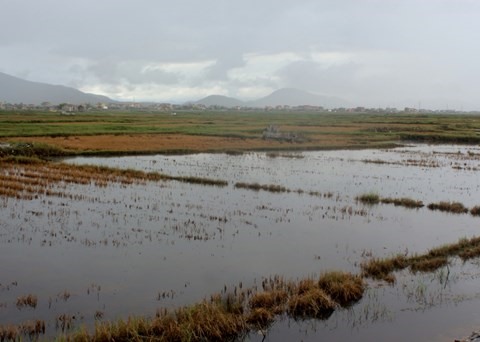 Environment
Environment

Farmers in central Quảng Bình Province are facing a dilemma as their paddy fields have been affected by salty water following the typhoon Doksuri last September.
 |
| The salinity has impacted 110ha of land in the province’s Bắc Trạch Commune in Bố Trạch District. Photo infonet.vn |
QUẢNG BÌNH — Farmers in central Quảng Bình Province are facing a dilemma as their paddy fields have been affected by salty water following the typhoon Doksuri last September.
The salinity has impacted 110ha of land in the province’s Bắc Trạch Commune in Bố Trạch District, leaving local farmers hesitant about sowing rice for winter-spring crops because of the fear of loss of crops. However, no start for the crops means poverty in the next year.
Nguyễn Thị Xoan, head of a village in the commune, said salty water has inundated local fields for a month now, but the villagers have failed to get it to flow out.
Local farmers said strong waves from typhoon Doksuri broke part of the local anti-salinity dyke, paving the way for salty water to occupy the local fields. Nguyễn Văn Minh, a local, said the saline soil could be washed out with floods from the upper rivers. Unfortunately, local power reservoirs have blocked water for their operational reservoirs and no flood has occurred yet.
Minh said young rice plants would die in the saline soil, and without floodwater, the soil would take a long time to be washed clean.
Nguyễn Ngọc Tuân, the commune’s chairman, said local authorities had released water from an irrigation reservoir, but the fresh water was insufficient to help clean the 110ha of soil.
Tuân said he expected continuous heavy rains would help local farmers out of the situation.
Currently, weeds growing naturally in the field die en mass because of rotten roots affected by salty water.
According to Nguyễn Ngọc Phụng, director of the province’s Irrigation Department, reinforcing the dyke is a sustainable solution for salinity in the locality. He said, however, insufficient capital for the dyke system hinders the work, suggesting more allocation of funds from the province and State budgets. — VNS




